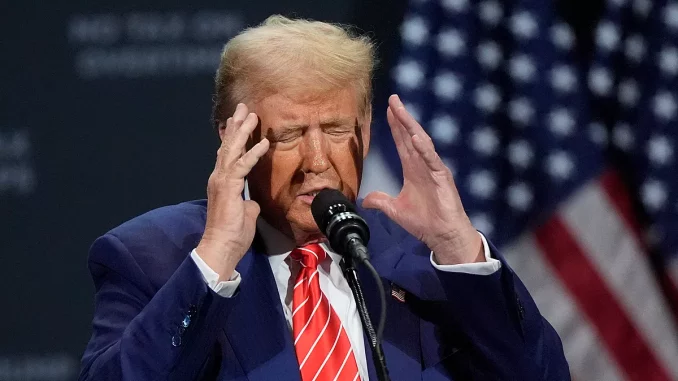
In a recent statement that has sparked considerable attention, former U.S. President Donald Trump addressed criticisms and comments revisiting his past administration’s issues, boldly declaring, “They want to get me a little, but they only add oil to the fire.” Trump’s words, made during a campaign rally, reflect his defiance in the face of ongoing scrutiny regarding the controversies and challenges that marked his presidency, including his handling of key political, legal, and social issues.
Trump, who remains one of the most polarizing figures in American politics, was responding to renewed criticism surrounding his administration’s policies, decisions, and legal battles. His presidency was often marked by intense controversy, with several key moments—including the handling of the COVID-19 pandemic, the impeachment proceedings, and the chaotic response to protests and racial justice movements—frequently revisited by his critics.
His statement, “They want to get me a little, but they only add oil to the fire,” speaks to his longstanding view that attempts to undermine or criticize his administration only strengthen his resolve. The phrase is a direct rebuke to those who have continued to focus on past issues as a means of attacking him. Rather than being deterred by these critiques, Trump maintains that they have only served to bolster his political presence and deepen his support base.
Throughout his presidency, Trump was a figure who thrived on confrontation, often using attacks from the media, political opponents, and even some members of his own party as a springboard to rally his supporters. His combative nature and unwillingness to back down from a fight have made him a deeply polarizing leader. To this day, Trump’s base of supporters remains loyal, and his combative response to criticism has only intensified his connection with those who share his views on governance and American exceptionalism.
In his recent comments, Trump referenced the ongoing legal challenges and investigations that have followed him after leaving office. From the ongoing probe into the January 6th Capitol riot to various lawsuits related to his business dealings and personal conduct, Trump has faced relentless scrutiny. Yet, rather than retreating from these issues, he has chosen to confront them head-on, often taking to social media or public events to attack the investigations and cast doubt on the motives of those pursuing legal action against him. His remarks about “adding oil to the fire” are a clear indication that he is not intimidated by the scrutiny but views it as a means to energize his political movement.
Many political analysts have observed that Trump’s approach to adversity is one of the key reasons for his sustained influence within the Republican Party. Despite controversies and numerous scandals, his base remains remarkably resilient, with Trump continuing to dominate the political conversation. His response to his critics, even in the face of legal challenges and negative press, underscores the unconventional style that defined his time in office and continues to shape his post-presidency persona.
The phrase “add oil to the fire” is also symbolic of Trump’s tendency to inflame situations rather than defuse them. Throughout his presidency, he often escalated conflicts, whether with political opponents, world leaders, or even the media. His tendency to stoke controversy has remained a central part of his identity, and it seems he is using the same approach in the face of ongoing legal and political battles. Rather than retreating or apologizing for his past actions, Trump has consistently positioned himself as a fighter, unapologetically standing his ground, even when under intense pressure.
Trump’s statement also highlights his perception of the political establishment and the media as being against him. Many of his supporters have long believed that he was targeted unfairly by both institutions, and Trump’s rhetoric has consistently reinforced this narrative. He has framed himself as an outsider, someone who is challenging the “swamp” of Washington, D.C., and the entrenched political elite. In this context, his defiant response to criticisms about his past administration reinforces his image as a populist figure who is fighting against the system.
However, not everyone is on board with Trump’s assessment of his legacy. Critics of his administration point to numerous issues where they believe he failed to effectively govern or address critical matters, from his response to the COVID-19 pandemic to his divisive handling of social justice protests. The ongoing investigations into his post-presidency activities, including his alleged involvement in the January 6th Capitol insurrection, have only added to the negative perception many have of his leadership.
Despite this, Trump’s political comeback efforts, particularly as he eyes a potential run for the presidency in 2024, continue to gain momentum. His recent comments reflect his ongoing confidence and belief that, despite the criticisms, he remains a formidable force in American politics. Trump’s ability to turn past controversies into fuel for his political campaign is one of his trademarks, and his supporters remain steadfast in their belief that he will continue to be a leader for their vision of America.
In conclusion, Donald Trump’s response to critics and revisiting past problems with his administration is emblematic of his resilience and combative approach to politics. Rather than shying away from criticism, he embraces it, viewing each challenge as an opportunity to galvanize his base and strengthen his political position. His statement, “They want to get me a little, but they only add oil to the fire,” underscores his unwavering belief that the more his critics attack him, the stronger he becomes. As the legal battles and political debates surrounding his legacy continue, it’s clear that Trump intends to use every opportunity to continue shaping the national conversation and asserting his influence on the future of American politics.
Leave a Reply